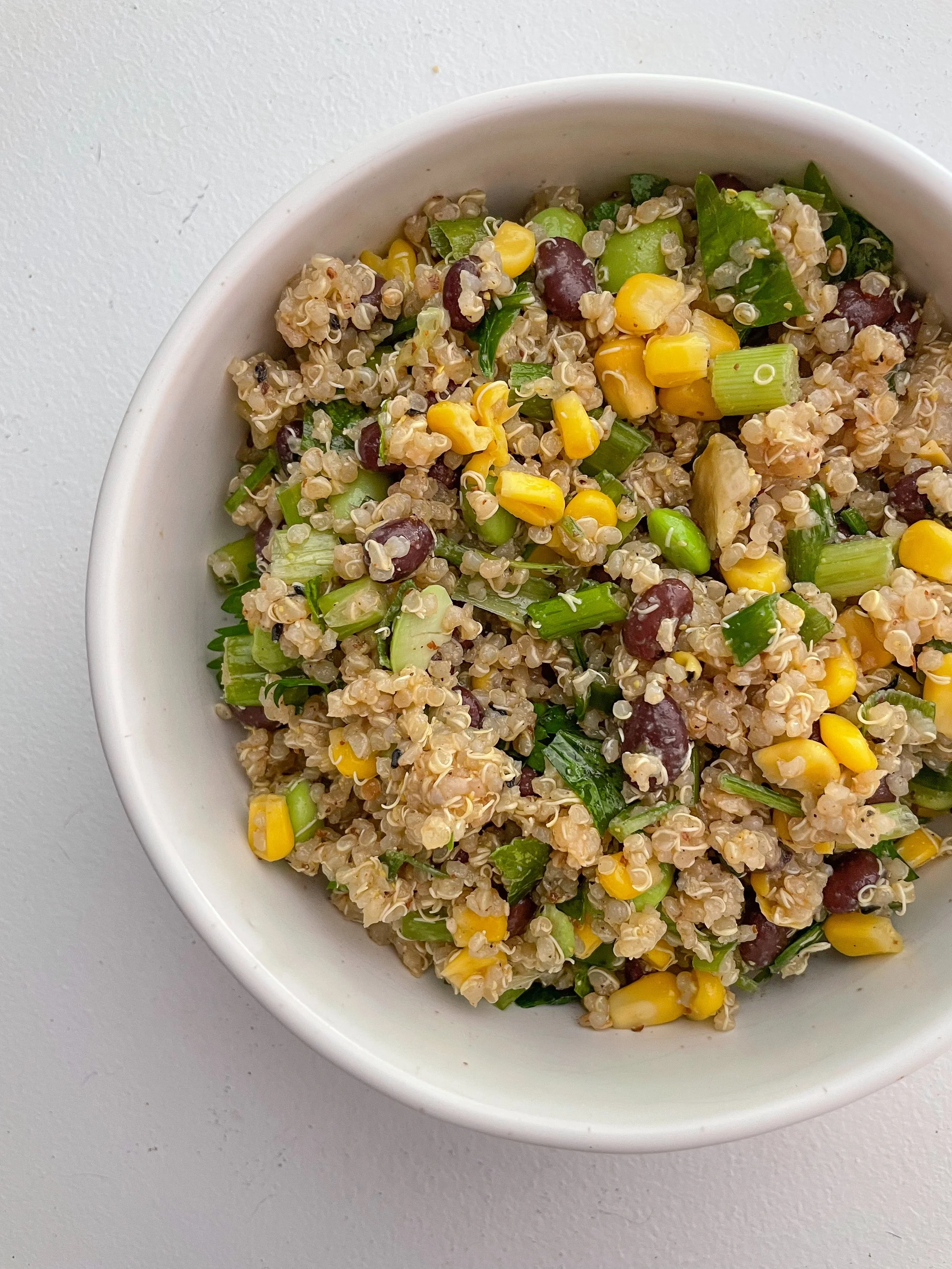9 Plant-Based Protein Sources

Some people make it seem very challenging to get all your protein in on a plant heavy or plant exclusive diet. I personally, don’t think that’s the case. We are more likely to be fibre deficient. It does require some effort and planning though and every needs different amounts of protein based on level of activity. I thought I would share some of my favourite plant protein sources.
Just remember, plants have all amino acids, they just vary in quantity. You also don’t need to combine foods during a meal, like rice and beans, to get a complete protein. We previously thought we needed to, but now we know the body stores them for a few days.
Eating enough protein is important for hormone and gut health. It will also impact energy levels and feeling anxious due to the blood sugar rollercoaster. I suggest my clients aim for 20-30g of protein per meal with breakfast being the most important. If you’re eating lots of whole foods (even some healthy foods are processed - think of spices!) then you’re probably doing pretty good.
my favourite sources of plant protein - and no, you don’t need to fear non gmo soy.
Tempeh 15g of protein for 100 g. I crush tempeh so hard. It makes a perfect protein for breakfast, lunch or dinner
Smoked tofu 14g for 1/2 a block. Opt for organic or non-GMO for all soy products. They’re high in phytoestrogens, which are so beneficial for low estrogen, high estrogen or xenoestrogen presence (chemicals that interfere with our hormonal health)
Protein powder 15-20g per scoop. I love this brand in my oats because it tastes good and it provides an extra 15g for a tiny scoop. Code JORDANBRUCE for 10% off. When I’m making a smoothie, I opt for this brand at 20 grams. They also have fancy blends with added adaptogens. They recently changed the formulation adding a sweetener and I personally don’t like the taste in my oats or chia pudding. Both of these brands are Canadian and organic! You can find Botanica on my supplement dispensary too.
Soy milk 8-12g per cup. I always recommend unsweetened organic soy milk. I love it for it’s good fats and protein content. Silk is easy to find and calcium fortified with 8g of protein. Eden has 12 grams and isn’t fortified if you know you get enough calcium elsewhere. I love that Eden is shelf stable and makes hitting my protein goals at breakfast easy with a matcha latte. Not sponsored, none of this is!
Organic Peanut Butter 4g per TBSP. I’m a big fan of organic only peanut butter. None of this Skippy with added sugar, salt and oils. I do love the texture of Adam’s, but for hormone health, organic is the way to go! Pesticides are endocrine disruptors.
Beans 6-8g for 1/2 cup. I love the idea of soaking and cooking my own beans, but I’m guilty of not always doing it. Black beans have 8g of protein per 1/2 cup which is pretty do-able to consume. If soaking your beans at home, add some kombu to help break down the complex sugars in beans and reduce gas. If you’re buying at the store, aim for BPA free cans, organic if possible, no sugars added. Some brands will add salt, others have kombu for preservation and flavour.
Lentils 26g per 1/2 cup. I absolutely love lentils as they’re so versatile in recipes and have lots of protein. All plant protein has fibre, but lentils have insoluble and soluble fibre! Having regular bowel movements is key to hormone and gut health.
Chickpea Lentil Pasta 23g per 1 cup Dry. I’m obsessed with this Costco find, I may have over done it to be honest. High protein pasta is amazing because you can add whatever veggies you have on hand and not worry about adding any extra protein. Makes great leftovers too. I even suggest this to my 100% plant-based clients on candida and parasite protocols - too much restriction is mentally so challenging.
Edamame 11g per 1/2 Cup. Have them alongside your sushi, tossed in a stir fry, pasta or on a salad. Heck, eat them as a snack. They’re so tasty and can take on the flavour of sauces or dried herbs. I’ve been adding smoked kelp flakes. I also love peas, even though they’re lower in protein than edamame. Toddler friendly!
What did I miss? Pop your favourite plant protein in the comments below!
Jordan Bruce, Gut Nutritionist

Your guide to everything you need to know about protein. How much protein you need, meals ideas, plant-protein foods and perimenopause.
As a gut health nutritionist, I give you practical tips, plant-based foods high in iron and a recipe. I also explore reasons why your ferritin may be low.
There are so many different types of magnesium, it’s overwhelming. Thanks to my work experience student, we have complied a chart and a description of each type so you can make an informed decision. Curious to learn your magnesium levels, book in for a hair mineral analysis test.
A week of gut health tips to get your microbiome thriving! Easy to incorporate with a focus on diversity and plants by Jordan Bruce, a holistic nutritionist.
There is so much misinformation about soy consumption. Read why this nutritionist, Jordan Bruce, recommend you eat soy food.
Great for period pain, inflammation, liver detoxification, gut health protocols and hormone balance
Everything you need to know about flax! Why you should include it in your diet and how to prepare
Want to include more plant protein for health reasons? Not sure where to start? Here’s 9 of my favourite plant protein sources and my thoughts on each one!
Paleo? Keto? Let’s stop these short term diets and move towards something more sustainable. My top 6 gut health tips to ease into 2024
Everything you need to know about the bacteria H. pylori and how to support it naturally
Let’s dive into how you can improve constipation, I’ve got a tip for you! Cover image thanks to the book, Gut.
Your nervous system impacts your IBS, digestion, hormones and mood! Read up about the vagus nerve with actionable tips you can take today.
1/10 are diagnosed with endometriosis and it often takes a decade to get a diagnosis. Learn the symptoms here in this blog post!
Read this list to ensure you’re supporting your hormones! Food is powerful and can impact our sex hormones.




























